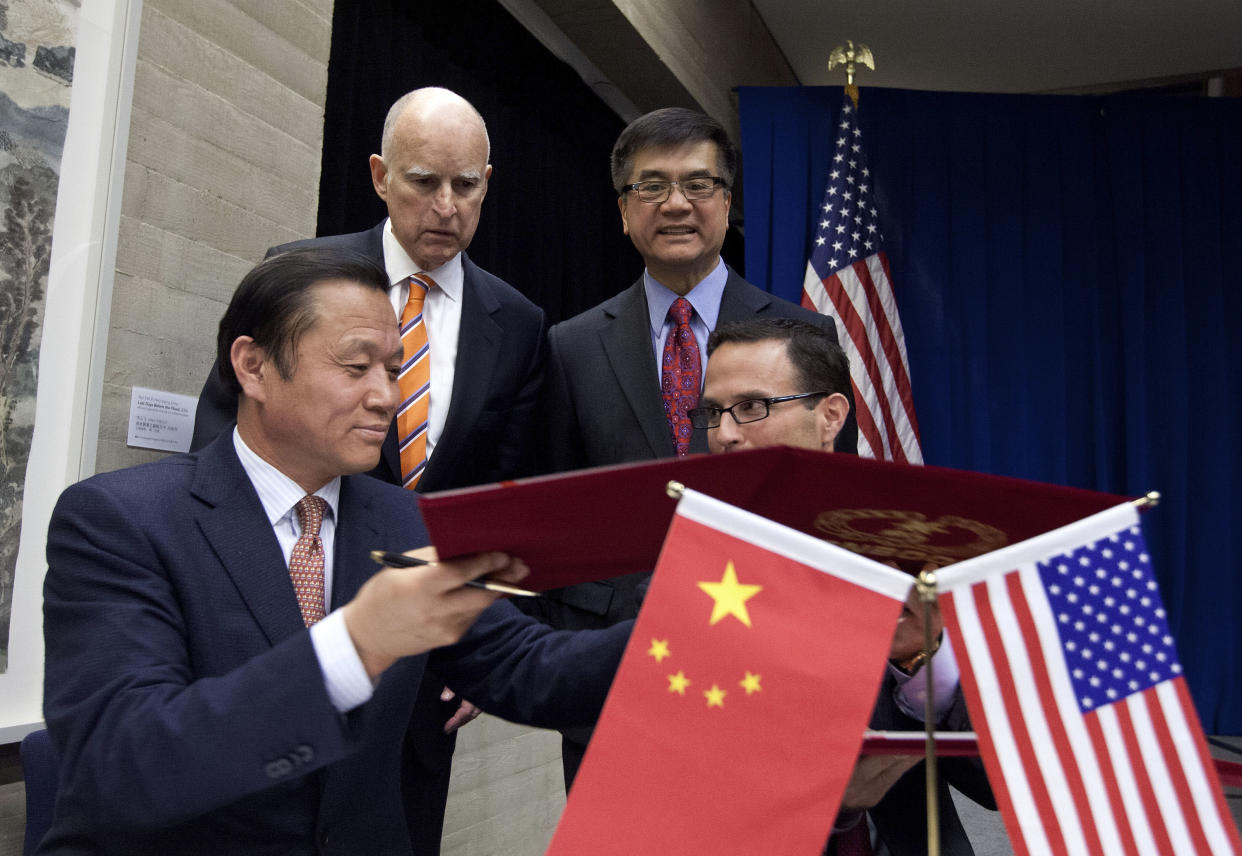Brown touts Chinese investment as visit begins
Brown promotes Chinese investment in Calif. as trade mission opens, signs symbolic trade pacts

U.S. Ambassador to China Gary Locke, standing right, and California Gov. Jerry Brown, standing left, witness a memorandum of understanding between U.S. and China during a Trade and Investment reception at the U.S. Embassy in Beijing Wednesday, April 10, 2013. (AP Photo/Andy Wong, Pool)
BEIJING (AP) -- Gov. Jerry Brown announced a $1.5 billion Chinese investment in an Oakland construction project on Wednesday during the start of his weeklong trade mission to China.
He also signed symbolic agreements on boosting trade between California and China and helping the world's most populous nation improve its air quality.
He announced at the U.S. Embassy in Beijing that China-based Zarsion Holdings Group will invest $1.5 billion in the 65-acre housing project on the Oakland waterfront, which has been in the works since Brown was mayor of Oakland from 1999 to 2007.
Plans call for construction to start next year on 3,100 residential units, 200,000 square feet of retail and commercial space, and 30 acres of parks and open space.
Brown said the development would create up to 10,000 jobs.
"This project is just one example of what's possible when business leaders in two of the world's most dynamic regions connect," Brown said in a statement released by his office in Sacramento.
While Brown helped get the project approved as mayor, the deal with Oakland-based Signature Development Group was negotiated independently of the governor's office, the Los Angeles Times reported, although the timing of Brown's trade mission helped motivate the Chinese partners to sign the paperwork sooner.
"It meant a lot to our investor to have some sort of celebratory affair," Michael Ghielmetti, president of the Oakland-based developer, told the newspaper.
The governor also signed nonbinding agreements on trade and the environment on the second day of meetings with officials from the world's second-largest economy. He has been joined by about 90 California business leaders from a range of industries and regions of the state.
The first agreement involves pursuing joint opportunities to boost trade and investment, although Brown acknowledged the state's reputation for red tape and his own limited willingness to offer tax incentives. The Democratic governor said the state's $1.9 trillion economy remains a magnet for risk-taking investors, startup entrepreneurs and other creative people.
"There's a problem there," Brown told the American Chamber of Commerce in China. "But somebody is getting part of that $1.9 trillion. If you don't want some of that, well then stay out."
The message contrasts with the usual sales pitches by governors who tout the advantages of their states. While Brown's administration seeks more Chinese trade and investment, California is already a well-known destination for the Chinese.
Chinese Vice Commerce Minister Wang Chao told Brown on Wednesday that a third of Chinese exports to the U.S. end up in or pass through California, and that China imports electronics, machinery, chemicals, fruit and other goods from the state.
The agreement signed Wednesday sets up a joint task force between California, China's Commerce Ministry and six Chinese provinces and regions to look for ways to expand investment and trade. Sectors identified for cooperation include infrastructure, environmental protection, agriculture and bio- and information technology.
Brown also signed an agreement with China's Minister of Environmental Protection, Zhou Shengxian, pledging to cooperate to improve air quality, protect public health, promote clean energy and protect the environment and natural resources.
China is known for heavy pollution, much of it from the nation's massive manufacturing industry. Earlier this year, the air quality in Beijing was rated as hazardous and residents were advised to stay inside.
Some of that pollution also makes it across the Pacific Ocean to California, cutting into Brown's own efforts for cleaner air at home.
In the springtime, about 10 to 20 percent of the total dust in high elevation sites in California is believed to come from Asia, according to the California Air Resources Board.
The cooperative agreement includes enhancing pollution control for industry and transportation, Brown's office said in a news release.
"Reducing pollution takes great political struggle," Brown said in the release. "We know in America it's not easy, so it won't be easy in Beijing. But to the extent that we can help, we would like to help."
On Thursday, Brown will highlight the state's interest in infrastructure by traveling from Beijing to Shanghai on China's high-speed rail system, which is the longest in the world.
The rail line benefits from heavy government financing and faces few of the environmental and legal hurdles that such projects do in California. For example, the land needed to build the Chinese system is often forcibly procured at below market prices.
At a dinner he attended Tuesday night, the governor marveled at the pace of construction in China, where the national government faces few of the political constraints endemic to U.S. decision-making.
"Boy, you've done a lot of building," Brown said, according to a report in The Sacramento Bee. "When I get back to California, the bulldozers are going to roll."
___
Associated Press writer Juliet Williams in Sacramento, Calif., contributed to this report.

